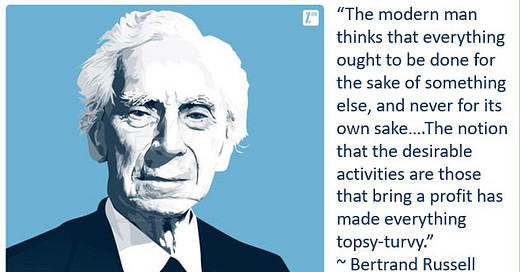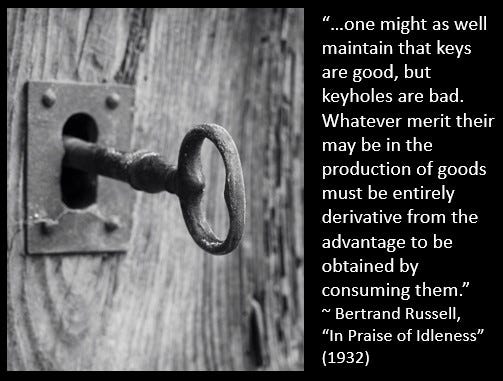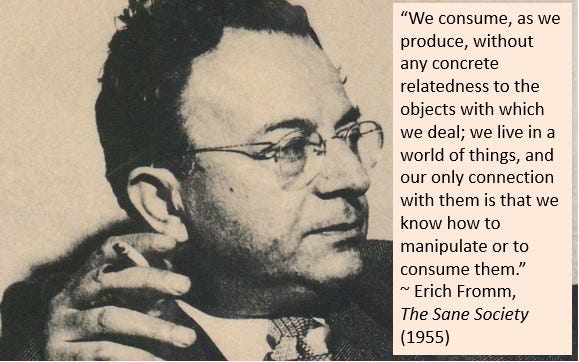The humanities teach us to distinguish between the means and the ends of life. They help us discern between what has value because it leads to something else—like grades, cars, money, status—and what has value because it is itself good—like love, personal development, and fulfilling experiences.
Philosopher Bertrand Russell's 1932 essay, “In Praise of Idleness,” explains that those who prioritize the means of sustaining of life over the joys that make life worth living, are like people who favor making keys over unlocking doors.
“…one might as well maintain that keys are good, but keyholes are bad. Whatever merit their may be in the production of goods must be entirely derivative from the advantage to be obtained by consuming them.”
The point is that it makes no sense to praise the building of a house without acknowledging the primary value of living in one. In his essay Russell gives the example of those who thought producing a movie was respectable but watching and enjoying a movie was wasteful, indulgent behavior. Producing a movie, they reasoned, was important “because it is work, and because it brings a money profit.”
Russell wrote that people similarly tended to affirm the productivity of the butcher and the baker in providing services and generating goods, but diminished delighting in the fruits of their labor as less unimportant. The exception is when eating such foods gives us strength to be more industrious.
But this manner of thinking yields absurd results. As Russell explained,
"The individual, in our society, works for profit; but the social purpose of his work lies in the consumption of what he produces. It is this divorce between the individual and the social purpose of production that makes it so difficult for men to think clearly in a world in which profit-making is the incentive to industry.”
To acknowledge the value of “productive” labor is to, also, affirm the value or importance of using or experiencing—consuming—what is produced. And to deny the value in consuming a product resulting from our labor is to deny the value of the labor itself.
If eating the bread that was baked has no importance, then neither does the baking of the unimportant bread. An important exception would be work that is itself satisfying. For example, we might be able to disregard the value of eating bread but still maintain the value of making it if the process of making bread was a creative and interesting experience in its own right.
Many are so mesmerized by the means-centered conception of value that they find it irresponsible or simply contradictory to expect work to be anything more than a burdensome stepping stone to something else.
Still, many are so inured to the definition of authentic work as boring, unsatisfying, and means-driven that they are skeptical of the legitimacy and value of intrinsically satisfying labor. This is an experience I can attest to, as someone with the privilege of doing work that is often as personally fulfilling as it is socially and economically productive. Many are so mesmerized by the means-centered conception of value that they find it irresponsible or simply contradictory to expect work to be anything more than extrinsically valuable, a burdensome stepping stone to something else.
When work or “productivity” is praised it is not because the activity is itself satisfying, but because it is useful. But there is an unacknowledged emptiness in holding up the “useful” in this manner since whatever is useful relies on still something else for its purpose. The question inevitably becomes, what is it all for? What is our useful production in the service of?
The conceptual root of the problem is the mistaken belief that the only things worth doing are those that lead to something else. Russell wrote:
“The modern man thinks that everything ought to be done for the sake of something else, and never for its own sake….The notion that the desirable activities are those that bring a profit has made everything topsy-turvy.”
Life is Not an Investment
The pioneering humanistic psychologist and social theorist, Erich Fromm, developed this thread of thought in The Sane Society (1955). He wrote that the dominant worldview reconceived of human existence as an economic endeavor, a series of ever-accumulating transactions.
“The whole process of living is experienced analogously to the profitable investment of capital, my life and my person being the capital which is invested.”
Fromm gives the example of a person who evaluates the worthiness of attending a concert or theatrical performance by putting the experience in financial terms. He wrote:
“If a man goes to a concert or to the theater, he asks himself more or less explicitly whether the show is ‘worth the money’ he paid. …fundamentally the question does not make any sense, because two incommensurable things are brought together in the equation; the pleasure of listening to a concert cannot possibly be expressed in terms of money; the concert is not a commodity, nor is the experience of listening to it…. The activity in itself is a productive act of living, and incommensurable with the amount of money spent on it.”
Envisioning our lives as capital to be strictly invested in only those endeavors that enhance our status or generate profit is absurd. The ultimate aim of life is fulfillment—experiencing and exemplifying what we believe is best in life. Experiencing an enlivening aesthetic performance, either in the theater or concert hall, is one of the ends or ultimate values that give life meaning and purpose. For some, these are some of the reasons we go to work and make money. Such experiences no more need to be profitable than does a father’s hug of his child.
After climbing the steps of the staircase of means, past products, possessions, services, and profit, we must eventually arrive at an end, something which is good itself.
The most important parts of human existence cannot be understood in financial terms because these ultimate values—what Abraham Maslow called “B” for “Being” values—form the basis of all calculations of economic value. Whatever has genuine, rationally determined financial value is that which enables us to develop, exemplify or experience these fundamental values. The means of life derive value strictly from their function to sustain those ends. After climbing the steps of the staircase of means, past products, possessions, services, and profit, we must eventually arrive at an end, something which is good itself.
Nevertheless, we continue to be culturally disciplined to justify joy by highlighting its usefulness—its extrinsic value. Fromm gives the example of a man who judges his morning walk “as a good investment for his health, rather than a pleasurable activity which does not need any justification.” This point was likely inspired by Henry David Thoreau, a thinker Fromm appreciated.
In “Walking,” Thoreau lauded the lost art of walking, not for its health benefits, but for the joys of the activity itself.
“…the walking of which I speak has nothing in it akin to taking exercise, as it is called, as the sick take medicine at stated hours—as the Swinging of dumb-bells or chairs; but is itself the enterprise and adventure of the day. If you would get exercise, go in search of the springs of life. Think of a man's swinging dumbbells for his health, when those springs are bubbling up in far-off pastures unsought by him!”
Thoreau, Fromm, and Russell are united in chastising the prioritization of the “useful” over the joys which give life its purpose. Some experiences—a kiss, a pleasant walk, a dance, a cartwheel, a laugh, a conversation—and characteristics—truthfulness, generosity, courage, compassion—are self-justifying goods; ends unto themselves. Though they may also be helpful in maintaining our health, enhancing our status, and the like, such usefulness is of secondary importance to their inherent goodness.
Rage Against the Means: Dead-end Consumption
Today, the prioritization of means over ends characterizes our habits of consumption as well as our attitudes toward “productivity,” understood as economically beneficial activity. This consumption is driven by a variety of factors including active marketing efforts attempting to persuade us that buying and possessing things is the best way to satisfy our deepest human needs.
This consumption, as with the approach to production that Russell criticized, has become detached from the authentic ends of human life. Fromm wrote,
“We consume, as we produce, without any concrete relatedness to the objects with which we deal; we live in a world of things, and our only connection with them is that we know how to manipulate or to consume them.”
Fromm contended that consumption had joined work and productivity in being unthinkingly compulsive and untethered from the genuine ends of life.
“The act of buying and consuming has become a compulsive, irrational aim, because it is an end in itself, with little relation to the use of, or pleasure in the things bought and consumed. To buy the latest gadget, the latest model of anything that is on the market, is the dream of everybody, in comparison to which the real pleasure in use is quite secondary.”
I’m reminded of lyrics to rock band, Rage Against the Machine’s song, “No Shelter,” pointing out marketing efforts to equate consumerism with transformational societal change.
“they got you thinkin' that/
What ya need is what they selling/
Make you think that buying is rebelling.”
We are encouraged to purchase products like Oreo’s pride cookies or a t-shirt espousing a love of the earth as a replacement for civic engagement and participation in social movements for change.
The failure of consumption to fulfill us as human beings is made clear by the short-lived pleasure we derive from buying and having. This is to say nothing of the fact our desire to have more is fed by the discontentment of our purchased pleasure. Our possessions often leave us emptier and more dependent on external objects than before. This leaves us more vulnerable to marketed visions of happiness requiring quick, cheap, and easily purchased pleasures. These pleasures do not, however, add up to genuine joy or sustained happiness. And in the process we are alienated from our own inner humanity and the deepest sources of human happiness.
We turn to material consumption as a salve to treat the ache of unfulfillment caused by devoting the majority of our waking-hour existence doing work we do not enjoy.
One of the great ironies is that our material consumerism and the ever-growing economic demands it makes on us is stimulated by the deadness of many people's perfunctory working lives. We turn to material consumption as a salve to treat the ache of unfulfillment caused by devoting the majority of our waking-hour existence doing work we do not enjoy. Many of us have been caught in the lifeless hell of alienation in which we use our lives to advance the means of life rather than pursue and affirm the ends; a violation of the principle of human dignity outlined by Kant.
As with the value of a particular kind of labor, the value of the goods and services we purchase is rooted in their service to the fundamental goals of human existence. The humanistic psychologist, Abraham Maslow, gave us a solid sense of what some of those values include:
truth, goodness, beauty, wholeness, aliveness, uniqueness, justice, order, simplicity, playfulness, autonomy, and fulfilment.
Truly valuable work, or consumption for that matter, must be anchored in such fundamental aspects of our shared humanity. The humanities reveal their indispensable worth again and again by teaching us this lesson and by helping us experience the best of being human.










